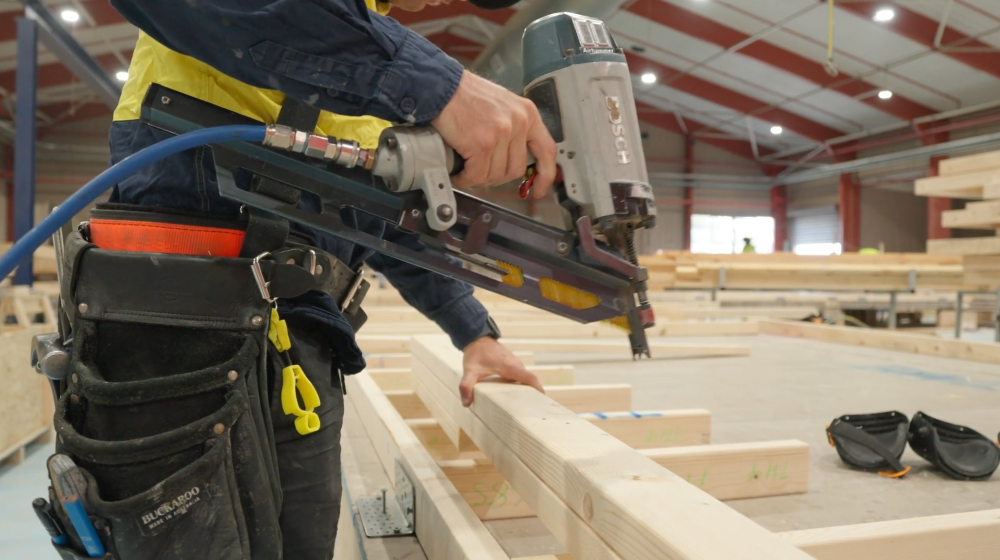Funded project- Reducing 50% of construction waste through prefabrication
The project validated the waste, cost, and time-saving potential of prefabrication in Victoria, providing evidence and a business case to support future private investment in the sector.
Background
The construction industry is one of Australia's largest waste generators, responsible for 30-40% of total solid waste globally. By 2025, annual construction waste is expected to reach 2.2 billion tonnes, with approximately 30% of building materials delivered to traditional construction sites ending up as waste.
Cross Laminated Offsite Solutions (CLOS), formerly based in Geelong, specialised in constructing volumetric and flat pack elements. The organisation invested in innovative building practices, including a Glue-laminated (Glulam) timber production line, to explore methods of reducing building waste through direct, factory-based recycling measures.
The project demonstrated waste avoidance, cost reductions and increased performance of prefabricated homes. The initiative assessed these outcomes against traditional construction methods and showcased best practice through collaboration with partners including Monash University, Ys Housing, AKD Softwoods, and Ireland Brown Constructions. The project delivered 28 prefabricated townhouses near Geelong. A Material Flow Analysis (MFA) was conducted to collect data, benchmark and improve waste reduction opportunities against standard Victorian building practice.
Stages
| 31/08/2022 | Installation of equipment including gantry system, saws, and joist press. Strategic assessment and stakeholder workshops conducted. |
| 31/10/2022 | On-site data collection and analysis. Development of detailed designs for CLOS technology. Testing on Melbourne affordable housing site. |
| 09/01/2023 | Business case development, stakeholder workshops, and timber supply chain integration. Material flow analysis phase 1 commenced. |
| 30/05/2023 | Installation of 28 townhouses in Geelong. Data collection and quality assessments. Material flow analysis phase 2 completed. |
| 31/08/2023 | Case study preparation and final reporting. |
Outcomes
Meta-Analysis by Future Building Initiative
The systematic literature review and meta-analysis undertaken by Monash University's Future Building Initiative (FBI) found that, compared to conventional construction methods, prefabricated building was:
- ~18% less material intensive, and generated
- ~40% less waste.
Prefabricated Townhouse Pilot
The project delivered 28 prefabricated townhouses near Geelong in partnership with Ireland Brown, a large builder. The pilot project was utilised to:
- Better understand the waste systems, particularly for townhouses, and
- Identify opportunities for further reduction.
FBI's Material Flow Analysis revealed that 20.3% of the timber used in manufacturing for the pilot resulted in waste—equivalent to 78 tonnes (2.8 tonnes × 28 townhouses). When compared to traditional construction methods and aligned with the literature review's 40% waste reduction finding, the project saved an estimated 31 tonnes of timber waste:
- 2.8 tonnes × 1.4 = 3.9 tonnes for business-as-usual
- 3.9 tonnes - 2.8 tonnes = 1.1 tonnes of avoided waste per townhouse
The analysis focused specifically on timber waste, as CLOS primarily prefabricated the timber structure (floors, walls, roof). While other materials maintained standard efficiency, additional waste reduction was likely to occur as more components were built off-site (such as plasterboard and metal cladding).
With an average townhouse gross floor area of 310 m², the project achieved 3.6 kg of timber waste avoided per m² of built area (310 m² ÷ 1.12 tonnes = 3.6 kg/m²).
During the 12-month grant period, CLOS delivered an additional 6 dwellings of similar scale using prefabrication methods. Assuming comparable waste savings, this avoided another 6.7 tonnes of waste, bringing the total waste savings to 37.7 tonnes during the grant period.
Challenges
Material Supply Challenges
In 2022, significant challenges arose in sourcing key materials, particularly Laminated Veneer Lumber (LVL) and Machine Graded Pine (MGP). External market factors severely impacted supply and demand dynamics. To mitigate these shortages, the project team diversified their supplier network and established alternative trucking services.
Productivity and Labour Constraints
Labour shortages posed a significant challenge to production efficiency. This was partially addressed through the implementation of a Computerised Numerical Control (CNC) machine, which helped streamline manufacturing processes.
Operational Adjustments
To overcome these challenges, additional team members were strategically appointed to focus on key areas including data tracking optimisation, waste material handling improvements, and design and drawing modifications.
Insights for Other Victorian Businesses
Establishing a reliable material supply chain through direct manufacturer engagement and reducing reliance on subcontractors by expanding in-house labour capabilities proved crucial. The project highlighted the importance of streamlining manufacturing, material handling, and waste management processes in off-site construction.
From the Grantee
"CEBIC funding has been instrumental in CLOS optimising their offsite prefabricated system through obtaining true data on a real project. The traditional construction method of delivering raw materials to site followed by tradespeople 'building' onsite is tired and vulnerable to today's challenges."
 Fabrication in process.
Fabrication in process.